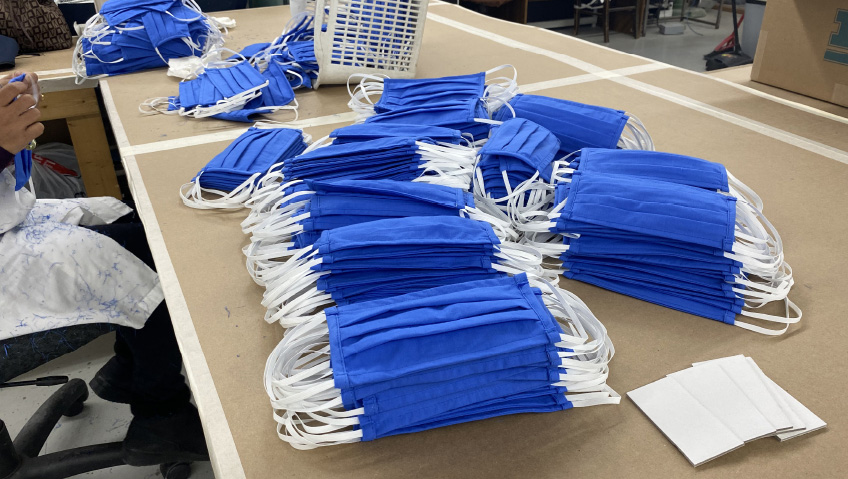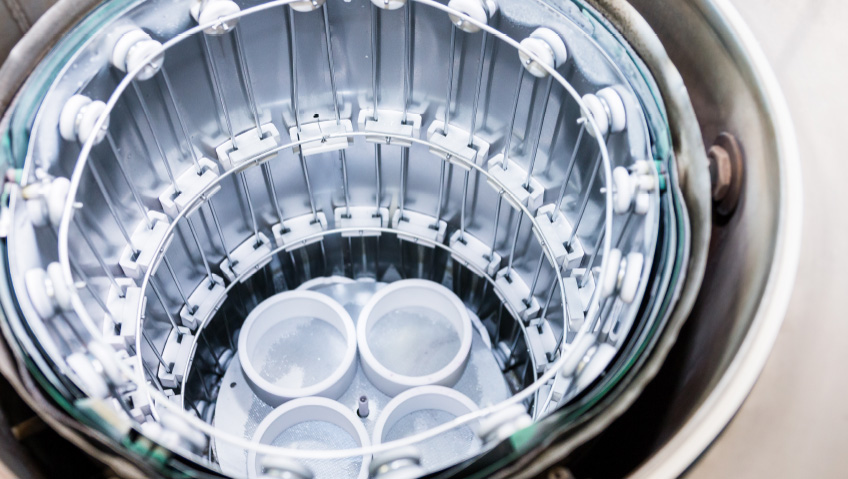“I said to the staff, ‘this is our call to duty.’ And when we found out there was going to be a shortage of masks and gowns, we started making these items without an order, saying, ‘Hey, we can do this. And we can give you thousands of these a day if you want.’”
-Marc Langlois, President of ICP
“We just put our hand up and talked to as many people as we could about what we could make, and what we could do to help. Because it looked like the world was in trouble,” says Marc Langlois, President of International Custom Products Inc. (ICP), a Toronto, Ontario sewing supplier that specializes in custom design, engineering and manufacture of mechanically stitched textile products.
Protection from the pandemic was essential to stop the spread and get those infection numbers down. But there was a shortage of masks and other personal protective equipment (PPE). Yet disposable masks and other single-use PPE gear were already choking landfills and floating like jellyfish in the oceans.
So when a manufacturing company decides to do its part by producing eco-friendly, reusable gowns and face masks to meet the demand, that’s a bright spot in a difficult time.
And ICP was just the company for the job. It already made an impressive range of products, from packaging designed to protect costly auto parts against damage to Royal Canadian Navy flotation jackets designed to protect valuable humans against hypothermia. A core part of the business is strategic defence and aerospace products like the giant parachutes that waft satellites safely back to Earth.
Customers bring in sketches and product samples and typically work in close communication with the design and production teams developing the design, sourcing materials and perfecting prototypes through to final approval.
Pressing pause
But this past March, regular business was put on pause to pivot operations to the supply of high-performance essential goods like medical gowns for hospitals and healthcare centres in the Greater Toronto Area and across Canada.
Alert to demands that the pandemic was about to place on the whole of global society, the company even partnered with a U.S. manufacturer to pool information on high pressure designing and fabricating of gowns in conditions that were novel to everyone.
ICP gowns are complex creations, rated for different levels of protection, from lower-level for regular hospital rounds to top-level for surgical procedures where even the seams of the garment have to be impermeable to particles borne on the air.
The global surgical-gowns market is expected to reach US $2.10 billion in 2024, driven not surprisingly by accelerating healthcare expenditure, as well as by a growing elderly population, by increasing awareness of safety and infection control, and by expanding urbanization.
Add to this the rising incidence of chronic diseases, the constant innovations in the design and function of surgical gowns, and the huge demand generated by the COVID-19 outbreak, and you can hear the knock of both need and opportunity.
ICP has doubled its business this year and is geared and ready to supply more gowns, masks and face shields if and when a COVID-19 second wave strikes. No more waiting for critical medical supplies shipped in by boat.
The reusable solution
“Reusable is the way to go,” says Jeff Killin, ICP Director of Defence Sales. “Not only in terms of our environment, but it’s also a much better return on investment as a customer. If people were paying five bucks for a disposable gown, now we have gowns where the average life-cycle cost is down to a dollar per use,” he shares.
“You can even wash them in a home washer and dryer, so you don’t need to put them through a sterilizer system. Our thinking was, let’s get something out that conforms with the standards now and is also usable in the future.”
Killin is also an infantry sergeant who has served in the Canadian military for 15 years as a training specialist for domestic and overseas operations. He knows from experience the importance of well-constructed, lightweight equipment in environments where there is no room for failure.
“Now I’m in a position to make sure that our customers and allies and people that I’ve served with get the best equipment and the best training possible,” he says. “It’s near and dear to my heart, and it makes all the difference.”
Going so many extra miles
At the outset of the pandemic, with the surge in demand for PPE, material was backlogged for two months. ICP sourced a Canadian company that made medical textiles, but up to that point these particular textiles had not been used for gowns, so ICP had the material tested and verified for production use and started making gowns for a local hospital.
In fact, the legwork and logistics required for engineering the gowns helped prevent a major hospital network from actually shutting down because it was almost completely out of PPE.
So it’s fitting that industry recognition has marked ICP’s 35th year in the business by naming it a finalist for Canadian Manufacturing’s COVID-19 Industry Leadership Honours in the Personal Protective Equipment – Medium-sized Manufacturer category.
This is a company that goes the extra mile for a good product.
“I’m really proud that we’ve been part of the solution,” Langlois says. He took the helm at ICP five years ago after consulting for the company on a succession plan. He was drawn to ICP by its entrepreneurial history that began with hockey equipment bags, and led to the admirable outfit with unique production capabilities of today.
Fast-tracking Canada
Now ICP is on track for further automation with robotic cutting and sewing, especially for its custom parachutes, turning two days of manual labour into a few hours by machine.
On that front, the company has also benefited as a member of Next Generation Manufacturing Canada (NGen), a not-for-profit organization that matches manufacturing companies with new technologies to drive advanced manufacturing in Canada. ICP is pursuing partnerships to bring more automation to its production line.
So there’s plenty of good news for domestic manufacturing in these uncertain times. The pandemic has exposed the limitations of the global supply chain and is expected to cause permanent market changes with more reshoring as growth prospects rise. Governments and industry are paying attention.
The hope is that governments continue to buy into local manufacturing and keep this momentum alive, Killin says.
“It’s not only PPE that’s important in terms of local production, but it’s also important that the guy who makes your jacket and the guy who makes your pants is able to do it domestically if required. That’s what we’re hearing. And it sounds like there’s a lot of support for that.”
As Langlois sees it, being flexible and quick to adapt to changing needs is critical in manufacturing – now more than ever.
“The world has been moving so fast,” he says. “We’ve had to take a step back and look at what’s going on. And we’re finding there’s lots of reshoring of Canadian manufacturing, especially in textiles. So we’ve put in some rather large bids on PPE automation projects that will change our company dramatically if we win them. It’s definitely been a year of change.”



